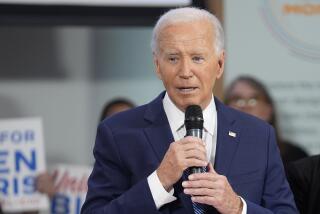COLUMN RIGHT : Wimp Factor Boomerangs on Democrats : None--not even Nunn--can be imagined as our commander-in-chief.
On Nov. 8 something happened to the nationâs leading Democrats. For weeks theyâd sounded tough on Saddam Hussein. Then suddenly Sen. Sam Nunn of Georgia turned dovish. Gov. Mario Cuomo of New York talked up a peace settlement in which Saddam Hussein would get land and oil. Sen. Albert Gore of Tennessee quibbled with President Bushâs assertion that Iraq would soon have a nuclear weapon. Sen. Edward Kennedy of Massachusetts urged Bush âto give peace a chance.â Gov. Bill Clinton of Arkansas preached caution. House Majority Leader Richard Gephardt of Missouri pleaded for âsufficient timeâ for economic sanctions to force Iraq out of Kuwait.
Hereâs what happened: Bush had crossed a threshold. Not only was he willing to deploy American force; now he was willing to use it. Democrats arenât.
Democrats, especially those with presidential ambitions, regularly flinch at the use of force. They may be right in some instances, but theyâre killing themselves politically. They come across as weak and indecisive--not the traits Americans desire in a President. Long after the confrontation is over, the residue of Democratic weakness remains. The result: Democrats canât win the White House.
Democrats arenât credible as commanders in chief. In 1983 six of the seven Democratic presidential candidates criticized President Reagan for invading Grenada. They endorsed the nuclear freeze, and bickered over whoâd backed it first. Not surprisingly, Reagan had the national issue all to himself and won easily. In 1988 Dukakis was critical of Republican interventionism and emphasis on military strength. When Dukakis rode in a tank, Bushâs media consultant, Roger Ailes, seized on it in a devastating TV ad. The point, Ailes says, was that âyou couldnât imagine him as commander in chief.â
Polls are often misleading on the national issues. The nuclear freeze, which Reagan opposed, was overwhelmingly popular. Reaganâs disdain for arms-control talks was unpopular. Yet when voters assessed Reagan, the whole was greater than the sum of the parts. In 1988 Bush was zinged for supporting aid to the Contras, a policy disliked by a solid majority of Americans. But what they didnât like was the Contras themselves. They had little problem with a leader willing to confront the issue.
Now Democrats are again being led astray by polls. Backing for Bushâs policy dipped after Nov. 8, when he appeared more likely than before to use force. Democrats pounced. Maybe theyâll get short-term political gain from this. Long-term, itâs disastrous. Unless thereâs a long war with thousands of American casualties, Bush is bound to come out ahead politically. âIf Saddam Hussein leaves Kuwait head first or foot first, George Bush wins,â says Ailes. âI think the Democrats have mishandled this thing.â
None more than Nunn. Nunn had the best reputation for strength in foreign policy and willingness to use force. Democratic Rep. John Murtha of Pennsylvania, chairman of the House military appropriations subcommittee, says Nunn has lost credibility by opposing the Bush buildup. Heâs sacrificed his biggest asset, his cool hawkishness. Nunn is careful to say heâs not against using force at some point, just not now. He barked at Defense Secretary Dick Cheney, âIf we have a war, weâre never going to know whether (sanctions) would have worked, are we? Thatâs the major point here.â My guess is that wonât be a major point in 1992. But if Nunn runs for President, his skittishness about using force will be.
However you slice it, Democrats have ceded the national issue to Bush. He could blow it, but heâs told aides that he has no intention of allowing the Kuwait issue to linger, unresolved. If sanctions dragged on for 12 to 18 months, Bush would lose face, popularity, and re-electability. He knows this. Either Saddam Hussein pulls out by Jan. 15 or heâll be forced out, Bush says. As to what Democrats think or say about this, Bushâs attitude is, who cares?
Only a few Democrats are worried about the partyâs anti-war posture. California Rep. Vic Fazio frets that âDemocrats may be seen as the party of peace-but-no-strength.â House Armed Services Committee hearings conducted by Rep. Les Aspin of Wisconsin countered Nunnâs. Rep. Stephen Solarz of New York argued the case for war, if necessary, before the Democratic caucus and the moderate Democratic Leadership Council. If Bush triumphs over Saddam Hussein without Democratic backing, Solarz said, then voters âwill keep us out of the White House forever.â My point exactly.
More to Read
Get the L.A. Times Politics newsletter
Deeply reported insights into legislation, politics and policy from Sacramento, Washington and beyond. In your inbox three times per week.
You may occasionally receive promotional content from the Los Angeles Times.










